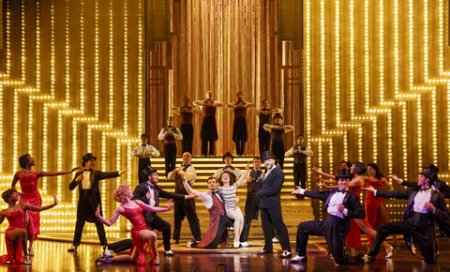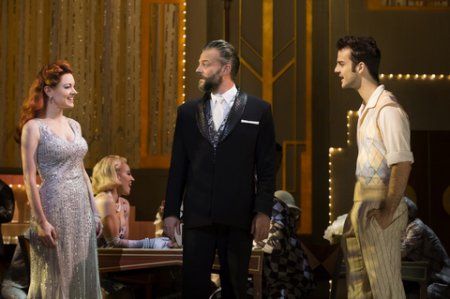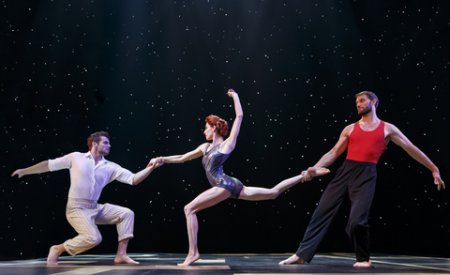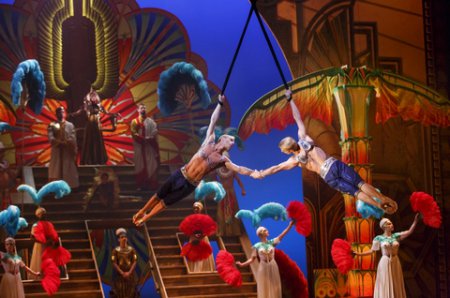Paramour (Cirque du Soleil)
In the best conceived number of the evening, “Love Triangle,” three acrobatic stand-ins for AJ, Indigo and Joey, (Samuel William Charlton, Myriam Deraiche and Martin Charrat, respectively), dangle precariously from circular trapezes enacting the constantly changing love triangle. It was as close to moving as Paramour comes.

The Cast of Cirque du Soleil’s “Paramour” (Photo credit: Richard Termine)
[avatar user=”Joel Benjamin” size=”96″ align=”left” ] Joel Benjamin, Critic[/avatar]Paramour, the Cirque du Soleil’s stab at producing a Broadway style musical at the Lyric Theatre, is the circus equivalent of a jukebox musical. Instead of songbook—Beach Boys, Four Seasons, Carole King, etc.—this show is a panoply of circus shtick: juggling acts, trampoline chases, trapeze acts, contortionists, teeter board high fliers, etc. Although the circus bits aren’t truly integrated into the overblown plot—a rather silly 42nd Street/A Star is Born/Red Shoes mash-up—it’s great to see the Cirque du Soleil performers in any context, but why the creators couldn’t dovetail the wonderful circus bits with an intelligent plot, is a mystery considering all the money that clearly went into Paramour.
Amid huge quantities of scenery—movie sets, NYC roofs and streets, the Old West, nightclubs and even ancient Egypt (!) (stylishly, if extravagantly designed by Jean Rabasse)—frustrated 1930’s movie director, AJ (a robust, solid Jeremy Kushnier), is incredibly discontented with his ditsy star, Lila (Kat Cunning, registering well in a small part). His loyal, hardworking secretary, Gina (Sarah Meahl, smashingly sexy and big voiced) drags him and AJ’s choreographer, Robbie (Bret Shuford, finding charisma in his good-natured, put-upon character) to a nightclub to hear flame-haired singer Indigo (Ruby Lewis, in a real star turn), accompanied by her boyfriend/songwriter Joey (Ryan Vona, a tad pallid, but sincere).
The nightclub, supposedly a dump, is so sumptuous that it puts the Rainbow Room to shame. Poor Indigo is besieged by acrobats and trapeze artists flying all over the place as she sings “Something More,” a title more prophetic than she knows. To her credit, she soldiers on despite the distractions and so impresses AJ that he snatches her up and decides to give her the star treatment while inadvertently falling desperately in love with her.

Ruby Lewis, Jeremy Kushnier and Ryan Vona in a scene from Cirque du Soleil’s “Paramour” (Photo credit: Joan Marcus)
Poor Joey, hired as a lackey to write Indigo’s songs, feels left out, but hangs on and eventually wins Indigo’s love.
When she chooses love over a glamorous career, AJ is enraged. He has filled his mind with fantasies of a big wedding and a sumptuous honeymoon. He releases a posse of Damon Runyon-esque, zoot-suited toughs to pursue Indigo and Joey to the rooftops of Manhattan where, in one of the best scenes in Paramour, they all bounce from rooftop to rooftop to fire escapes to apartment windows, with tragic results.
In between AJ discovering Indigo and her leaving him, he films scenes of Indigo as if she were the star of a series of movie posters, most of which are from films released decades after this show supposedly takes place. Each poster is an excuse for a circus act. The Cleopatra poster elicits a performance by Andrew and Kevin Atherton, two hunky blonde aerial strap twins who fly daringly out over the audience and meet midair for some dazzlingly sensuous pairings.
Calamity Jane becomes a Seven Brides for Seven Brothers type contest, with dancers and acrobats jumping skillfully over constantly moving boards and flying breathlessly into the air off of teeters.

Martin Charrat, Myriam Deraiche and Samuel William Charlton in a scene from Cirque du Soleil’s “Paramour” (Photo credit: Joan Marcus)
In the best conceived number of the evening, “Love Triangle,” three acrobatic stand-ins for AJ, Indigo and Joey, (Samuel William Charlton, Myriam Deraiche and Martin Charrat, respectively), dangle precariously from circular trapezes enacting the constantly changing love triangle. It was as close to moving as Paramour comes.
Otherwise, there is plenty of hyperactivity and overacting to watch, all of it mildly pleasant and in such a volume that no one in the audience could complain about paying Broadway prices for this show.
The songs by Bob & Bill/Guy Dubuc & Marc Lessard (music) and Andreas Carlsson (lyrics and co-composer) don’t quite come up to the standard of great pastiche, but give the performers plenty of material with which to sing and dance their hearts out.

Andrew and Kevin Atherton in a scene from Cirque du Soleil’s “Paramour” (Photo credit: Richard Termine)
Choreographer Daphné Mauger has had to work in the shadow of the physical derring-do of the circus artists (staged by Verity Studios), but she puts her large chorus through their paces with several standing out: Nate Cooper as a study in inspired slapstick; Zhengqi Xia, who delighted in soaring over everyone’s heads; and Reed Kelly, a reed of a fellow who made his presence known by his prowess, even with his many costume changes.
The costumes by Philippe Guillotel, sumptuous and glittery, are put to the test by a cast whose limbs always seemed to be splayed out in all directions. The outfits are beautiful, if fanciful, approximations of the undetermined time line of the show.
Philippe Decouflé directed and conceived the show. He hasn’t managed to make the plotline gel into a sensible, dramatic whole, but he certainly keeps the pace up with the help of the lighting designs of Patrice Besombes and Howell Binkley, the projections of Olivier Simola and Christophe Waksmann and Pierre Masse’s rigging and acrobatic equipment which had to be carefully—and safely—integrated into the scenery.
Paramour (through April 16, 2017)
Lyric Theatre, 213 West 42nd Street, in Manhattan
For tickets, call 212-556-4750 or visit http://www.lyricbroadway.com
Running time: two hours and 15 minutes including one intermission






Leave a comment